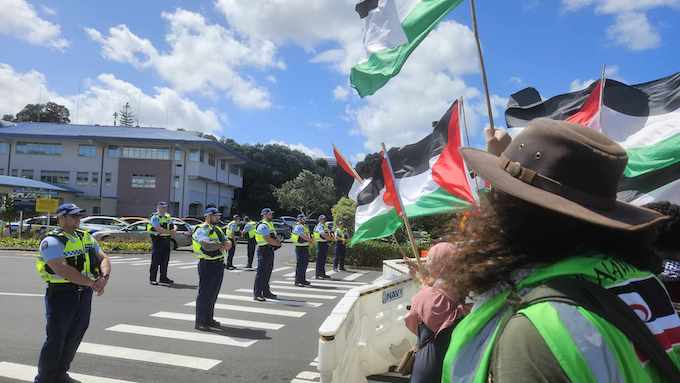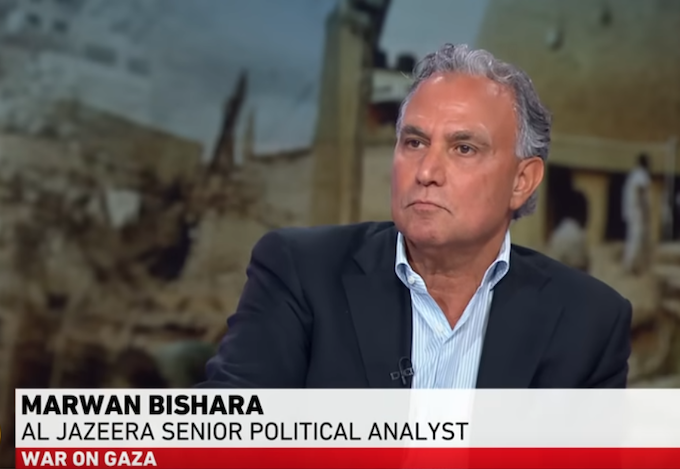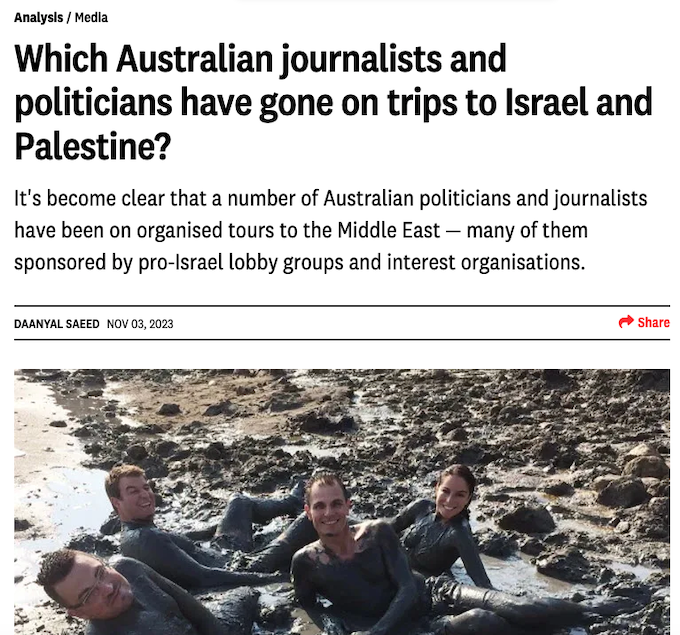It was not surprising that the U.S.’s earsplitting anti-Russian uproar has recently slowed down considerably. Israel’s Zionist genocidal war on the Palestinian people entrapped in Gaza (occupied first in 1967, and then totally blockaded since 2005) stole the limelight. The momentary slowdown gave Russia some breathing time, and the U.S. a possible way out of the mess it had engineered. Irrespective of Russian voices claiming the conflict has “Entered its endgame”, or American declarations talking about a “Negotiated settlement”, the conflict continues unabated.
Let us assume that Russia would accept withdrawing from Donbass in exchange for Ukraine meeting all or some of its conditions. Would that change U.S. behavior toward Russia? No. Extensive political and military indicators (aid, weapons, statements, effective policy, etc.) enacted by the United States and its allies preclude such possibility—U.S. objectives in Ukraine go beyond Donbass and Crimea. Clues: Several U.S. political quarters and think tanks are now calling for a policy of containment toward Russia.
It is elementary that spoiling relations among states is easier than repairing them. In the case of the United States, the idea of repairing ties with Russia has been consistently anathema to U.S. imperialists —even before Russia’s intervention in Ukraine. By force of consolidated ideological patterns, U.S. ruling circles systematically seek submission not agreement. Accordingly, their view of conflict resolution is conditioned by (a) the scope of U.S. intervention in Ukrainian politics vis-à-vis Russia’s objectives, (b) historical precedents whereby hegemonic ambitions takes precedence over other matters, and (c) intense enmity toward a Russia that has been proving its resilience to subjugation.
As a primer to understand deep-seated U.S. political personality disorder, consider the following. In the American imperialistic mentality of coercion, changing foreign policy conduct means retreat, and retreat means loosing. It is known though that changing course for the sake of settlement is not losing. What is happening here is easy to explain: U.S. ideologues of war abhor giving up any of the geopolitical advantages they have obtained so far at the expense of Russia. Reading between the lines: those same ideologues appear to be thinking in terms of opportunity—if they do not succeed at incapacitating Russia now, they never will.
Still, could Russia impose its conditions whereby Ukraine declares neutrality, forgoes joining NATO, and accepts post-intervention realties? Would the United States accept relinquishing its heavy encroachment in Ukraine thus leading it to (a) erase its established military footprints and political control, and (b) reprise its normal relations with Russia?
Russia has all means to inflict irreparable military defeat on Ukraine. But after almost two years of war without a decisive solution, such prospect seems out of favor with Russia for reasons it did not disclose. This leaves a diplomatic solution open. But this seems out of Russia’s hand because in the pursuit of maintaining its grip on Ukraine, the U.S. would not allow it. The collective answer to the questions above would be as follows: because U.S. calculations are global in nature, the immovable tenets of U.S. super-militarized capitalism and aggressive hegemonic world outlook will be the determinant factors in deciding future directions. Said otherwise, the ideological superstructure of the U.S. Empire– coupled with the prospect of material profits—is the engine driving its decision-making.
Consequently, the chance that the United States could reach a compromise with Russia soon is dim. The U.S. ruling establishment would keep the tension going with the expectation that something beneficial to the American imperium could still happen. In retrospect, a compromise could have happened had Russia crushed Ukraine militarily from the very beginning, and had U.S. rulers abstained from putting all their weight to defeat Russia through a protracted multi-actor proxy war. To recap, today, the prospect that Russia could impose its conditions on Ukraine is next to nil for no other reason than the United States is materially in full charge of Ukraine and its policymaking.
America’s decision for a protracted proxy war comes in varied ways. A mouthpiece of U.S. imperialism, former NATO secretary Anders Fogh Rasmussen, conveyed U.S. thinking about Ukraine joining NATO in the following words:
The time has come to take the next step and extend an invitation for Ukraine to join Nato. We need a new European security architecture in which Ukraine is in the heart of Nato. . . The absolute credibility of article 5 guarantees would deter Russia from mounting attacks inside the Ukrainian territory inside Nato and so free up Ukrainian forces to go to the frontline. [sic], [Italics added].
“Free up Ukrainian forces to go to the frontline” are the keywords. Meaning: U.S. war by delegation would continue. But the core meaning is unequivocal: according to Rasmussen’s formula, the U.S. would continue pursuing its war efforts notwithstanding Russia’s objections. Reminder: one reason why Russia intervened in Ukraine was to stop it from joining NATO. Rasmussen’s intent, therefor, was all too evident: he [actually, the United States] wants to poke Russia right in the eye by admitting Ukraine to NATO. Logically, his call can be interpreted as a blatant provocation to spur Russia into an expanded reaction. Once done, NATO would invoke article 5. Clear purpose: create a pretext for direct war with Russia.
Another mouthpiece is retired U.S. Navy Admiral James Stavridis. Stavridis thinks of Ukraine in terms of financial opportunities for U.S. economic imperialism and future Ukrainian dependency. He cites, with twisted ideologism, the South Korean example and gives his far-reaching views as follows:
In terms of advantages for the alliance, Ukraine would have the most battle-tested, innovative and motivated forces in Europe. The Ukrainians have earned a spot on the team, and as I look back on my time as NATO’s military commander, I would have been happy to welcome them into alliance…. If such a deal is reached, here is my prediction: Despite being far smaller in terms of population and land, Ukraine will overtake Russia in a few decades in terms of gross domestic product, overall agrarian output, and certainly in the sense of being a vital, democratic society in which people want to live. I see nothing in the twisted policies of Czar Putin that will change that depressing outcome for Moscow. Let’s hope a Korean-style miracle of reconstruction is on the horizon for Ukraine. [Italics added]
Discussion
U.S. imperialism assumes diverse denominations according to circumstances. The following are a few examples. Diplomatic Imperialism: is when the U.S. coerces foreign governments to go along its foreign and domestic policies. Financial Imperialism: through financial institutions (World Bank, SWIFT system, International Monetary Fund, Central banks of targeted countries, currency conversion rates, etc.), the United States exercises its hegemony by denying and/or regulating access by designated adversaries. Management Imperialism: is when American citizens connected to the high echelons of power directly manage the economic assets and political decision-making of foreign nations.
With regard to Management Imperialism as applied to Ukraine, Mike Pompeo has already started the process proposed by Stavridis. Just like Hunter Biden before him sitting on the Board of Directors of Burisma, Pompeo will be sitting on the Board of Directors of the Ukrainian branch of Veon. Beyond that, Stavridis wants a future Ukraine to continue exercising its proxy military role vs. Russia, which is, per se, what the United States wants: a lasting war with Russia.
Rasmussen and Stavridis’ opinions follow a coordinated script with two postulations: (1) The United States would not give up its newly found protectorate Ukraine, and (2) it would continue to wage war against Russia regardless of potential global conflagration—with the hopeful gamble that the “endgame” would not come to that.
As stated, the United States seems not ready to concede its footprints in Ukraine unless by some sort of a war with Russia. Or, a better scenario: the U.S. concludes there is no way out except by compromise. Overall, abandoning the coveted conquest of Ukraine would mean halting U.S. imperialistic expansions. Explanation: having footprints in Ukraine means that the United States would re-apply its old methods of domination—a process begins with a pretext, followed by intervention, and ends up with entrenched encroachment that political exorcism is incapable of dislodging. Consider the following limited examples:
Germany: after occupying half of Germany (West) at the end of WWII; after the U.S., Britain, and the USSR slapped it with the Potsdam Agreement; after it and Britain took the lion shares of war reparations; and in spite of Germany’s formal status as an independent country within NATO structures, the U.S. is still occupying it on permanent basis. Today there are 35,221 U.S. troops stationed in Germany. British and French troops still exists in different form. Pay attention. While the Potsdam Agreement imposed the dismantling of the German military industry, the United States reversed it by absorbing West Germany into NATO in 1955. This means the re-armament of Germany—NATO countries must have a standing military force with budget and with contribution from their Gross National products to the efforts of future wars—with the USSR being the target. The point: once the United States intervened in a country, it remains there until events change the status of occupation.
Italy: after occupying Italy at the end of WWII, etc., the U.S. is still occupying it through 7 military bases and 12,493 troops. Pay attention: After the defeat of Italy, the U.S. first shackled it with the Paris Conference, and then absorbed it in NATO structures in 1949,
[Note: on the case of Germany (before reunification in 1990-1) and Italy, the conversion from vanquished enemies to NATO allies was a planned U.S. strategy to absorb them as occupied countries by other means.]
Japan: after occupying Japan at the end of WWII, etc., and after shackling it with myriad treaties and the writing of a new constitution serving its interests, the U.S. is still occupying Japan through 5 military bases and 50,000 troops,
Kuwait: after ending Iraq’s occupation of Kuwait in 1991, the U.S. is now occupying Kuwait through 7 military bases and 13,500 troops
Philippines: After it conquered the Philippines from Spain consequent to Spain-U.S. war, the U.S. granted independence to that nation in 1946. Pay attention: the United States shackled the Philippines with the Mutual Defense Treaty. U.S. military encroachment or occupation continues today with enhanced treaties and four military bases,
Saudi Arabia: from so-called Desert shield 1990 forward, the U.S. has been occupying Saudi Arabia through 3 military bases and 2,700 troops,
Iraq: Iraq is a yardstick to judge the U.S. plan for Ukraine. The United States invaded that country in 2003 and immediately partitioned it in two federated entities—Arab and Kurdish—without having any authority to do so. As per military dot com (connected to the Pentagon) the United States has 12 military bases in Iraq, and as per PBS (connected to U.S. Zionism and the wider imperialist system) the U.S. has 2,500 troops on the ground. [Note: Iraqi reports speak of 16,000 U.S. troops across the country. Comment: the notion of 2,500 troops is both risible and fake. If divided by 12, each base would have 208 service members. Observation: no military base could function with such a low number of service members].
Pay attention: before removing the bulk of its invasion force from Iraq, and after building several military bases around the country, U.S. imperialists shackled it with a treaty and called it “U.S.–Iraq Status of Forces Agreement”. With this ruse, the United States has been occupying Iraq for 21 consecutive years. For the record, on May 1, 2020, so-called Iraqi parliament passed a resolution calling for the American forces to leave Iraq. Over three a half years later, U.S. forces are still entrenched on Iraqi soil like a rock stuck inside deep mud.
What happened before and after the U.S.‑created Iraqi parliament issued that resolution?
On January 10, 2020, the Washington Post stated, “The Trump administration refused again Friday to recognize Iraq’s call to withdraw all U.S. troops, saying that any discussion with Baghdad would center on whatever force size the United States determines is sufficient to achieve its goals there”. Well. Finally, we know that so-called “Operation Iraqi Freedom” was about “whatever force size the United States determines is sufficient to achieve its goals there”. [Italics added]. (Also, read the statement by Mike Pompeo). “Goals”, they say. What goals are these if not the perpetual occupation of Iraq by any means?
On January 10, 2024, Iraqi Prime Minister al-Sudani—the U.S. greenlighted his appointment—asked the United States to initiate dialogues for the exit of U.S. forces from Iraq. [Reuter’s: Exclusive: Iraq seeks quick exit of US forces but no deadline set, PM says]. Knowing about his request in advance, the Pentagon stated, “It was not currently planning to withdraw its roughly 2,500 troops from Iraq, despite Baghdad’s announcement last week it would begin the process of removing the U.S.-led military coalition from the country.” [Italics added]. [January 8, 2024, Reuter’s: Pentagon says not planning a US withdrawal from Iraq].
Now take a guess: who is ruling over so-called sovereign Iraq today, and who would be ruling over so-called sovereign Ukraine once the conflict is over?
Kosovo: the United States bombed Serbia, severed Kosovo (a genuine Serbian territory despite its large Albanian ethnicity), and proclaimed it an “independent” State. Remark: soon after it bombed Serbia and after declaring Kosovo’s independence, the United States transformed this historically Serbian province into a U.S.-occupied territory with its Camp Bondsteel. How is this so? Forget that NATO troops are in the camp and disregard its small size (955 acres). But, Bondsteel is a Regional Command under the control of the U.S. Army. As such, it is a plain symbol of U.S. imperialist encroachment, i.e., occupation by other means.
Taiwan: the U.S. may not object to re-unification; but its intent is apparent. It wants its protégé: the small island of anti-Communist Taiwan (23 million) to rule over great and independent China (1.4 billion)—not the other way around.
South Korea: After partitioning Korea (with the Soviet Union that successively withdrew) in North and South, the U.S. is still occupying South Korea through 12 military bases and 23,468 troops. (For more info: U.S. military around the world by Aljazeera).
To close, even if the conflict would resolve with compromise, Ukraine would end up being occupied by the United States in multiple ways—whether Russia likes it or not. Similarly, the prospect of the United States would occupy Ukraine somehow and shackle it with bases and treaties—with or without NATO—is potentially possible.
Generally, U.S. conduct in Ukraine follows an established ideological attitude that has been applied without pause since the end of WWII. Briefly, it rests on the self-serving idea that U.S. status as a military hyperpower (with 12 combatant commands spread in all continents) grants it extraordinary license to supervise, manage, and direct world assets and relations according to its exclusive views and objectives. One such view is the baseless pretension that whatever happens around the world is a matter of U.S. “national security”—recently, the Biden Administration declared, “Security assistance for Ukraine is a smart investment in our national security.” Senator Jack Reed goes beyond exaggerating the investment deception. He stated, “U.S. Aid to Ukraine is Vital to America’s Security & Economic Interests”.
These are bombastic words. (a) Biden’s White House is lying big—who are benefiting from that investment are weapons manufactures not ordinary Americans, and (b) the argument of the national security stuff is preposterous. To settle this issue without dissertation, suffice it to say there are no functional, structural, or any another artificially implied correlations between the events in Ukraine and so-called national security of super fortress America.
Statement: U.S. practice of calling anything that does not meet its criteria of acceptance a “threat to its national security” is fraudulent and deceptive. Discussion: the notion of “national security” paradigm of any nation is valid only when its physical existence and conditions for normal living of its people are threatened by external forces. Consider the following limited examples:
- Egypt continues to oppose Ethiopia “Grand Ethiopian Renaissance Dam” not for any reason except that the huge reduction of water entering into Egypt is effectively dooming its agricultural lands. When Ethiopia persists in ignoring Egypt’s legitimate concerns on water sharing (governed by stipulated treaties), then it is materially threatening Egypt’s national security and survival.
- When the CIA overthrew Mohammad Mossadegh’s government to control Iranian oil, it certainly damaged Iran’s national security.
- Venezuela never threatened the United States in anyway. But when Donald Trump threatened Venezuela with military intervention, his threat was a clear attack against Venezuela’s national security.
- When Britain and the United States declared war (Opium War) on China to open its ports for trade with the U.S. and the West—that was a flagrant infringement on China’s national security and sovereignty.
- Britain declared war on China because this prohibited the opium trade—a product Britain needed for its drug industry. But Britain and United States attacked and went to war with China for more reasons. They wanted China to open its ports for trade with the U.S. and the West. I need not debate that these acts were a flagrant infringement on China’s
national security and sovereignty. [ Read: “How were the Opium Wars an example of imperialism in China?”; “U.S. Department of State: Opium War“).
Conclusion: whereas themes and theories are invented to support the political concept of “national security”, countless other factors restrict its definition, scope, and applicability. But for the United States to enforce its so-called right to security by deeming any fathomable action taken by foreign nations in defense of their societal development as a threat to its “national security” is a barefaced blackmail on a domestic level, as well as a twisted pretext for confrontation on a foreign level.
Now, can anyone name one single incident whereby a country—excluding Russia (re: Cuban missile crisis)—has ever posed any threat to the United States? (For the record, the USSR tried to install nuclear missiles in Cuba in response to the US installing similar missiles in Turkey pointing to Soviet territory. Kennedy and Khrushchev resolved the impasse by dismantling the disputed missile systems.)
Conclusion: U.S. pretension that its security is uniquely important but not that of China, Russia, Iran, North Korea, Madagascar, Algeria, Columbia, Togo, India, etc. is a ploy to establish a world order under its tight command. Accusing others of premeditated malfeasance or intention to harm the United States is the easiest way to initiate planned hostilities.
With regard to Ukraine, the meaning of the preceding could not be terser: U.S. imperialists are manifestly scheming. They pretend to see Ukraine “free” from the “Russian invaders”, while at the same time they are roaming the globe to pacify it with death, destruction, sanctions, and economic strangulation, and while treating Ukraine as an “investment” to deter hypothetical connections to frivolous “security anxieties”. Deduction: U.S. fury over Russia’s intervention in Ukraine is quite readable. Russia interrupted U.S. march for world control.
Claiming, therefore, that Donbass or the whole of Ukraine is important to European and NATO security is a trite farce. If Donbass were so important, the U.S. should not have staged the Maidan coup, and should have worked to implement the Minsk Agreements. Commenting on how the United States turns things around in the attempt to muddy things à la Donald Trump, Maria Zakharova (Russian Foreign Ministry) responded eloquently to Antony Blinken’s call to revise the Agreements. She said, “It is strange how the US is trying to find a sequence in a document where the entire sequence of steps is spelled out for all parties”.
Incidentally, I read nowhere that Russia threatened Germany, Finland, or any other European country. But when trained propagandists at the State Department say, “Ukraine is a key regional strategic partner that has undertaken significant efforts to modernize its military and increase its interoperability with NATO,” they imply that this newly-found “strategic partner” is important to the United States because any arrangement with it increases the prospect of added security to NATO and the United States. The propaganda message is transparent: “Russia is threatening Europe”. American Progress dot org goes further. Johan Hassel and Kate Donald explain, “Why the United States Must Stay the Course on Ukraine”, and elaborate by saying, “Because it is essential to America’s national security interests and democratic values. A Ukraine defeat would create a more dangerous and unstable world.” [Italics added]. “Democratic values” they write. Could they intelligently—not stupidly to be precise—explain what values are these, and in which way they interact with the Ukrainian situation?
Now, imagine how the United States would react to hearing Russia claiming that the Sonora province or Mexico is “essential to Russian security and democratic values”.
To stay with the events, Russian intervention in Ukraine has led to the formation of two opposing camps. On one camp, stand U.S. super-militarized imperialism and arrays of vassal European States—most of them coerced to follow Washington’s direct orders. On the other, stands Russia alone but with only Belarus openly at its side.
At this tense stage of world history, there should be no illusion that Ukraine has become a peculiar arena. Russia’s limited intervention has swiftly gone beyond its initial purpose to protect ethnic Russians in Donbass, and beyond U.S. posturing that Russia breached international norms. No need to state that at no time in modern history did the United States ever care to abide by such norms—unless enacted to serve its purpose or to hold others accountable.
Russia’s Camp: From the time in which Bill Clinton and Zionist neocons (Madelaine Albright [State], Willian Cohen [Defense], Samuel Berger [National Security Advisor] took control of U.S. foreign policy until its intervention in Ukraine, Russia—despite its conversion to capitalism—has gradually but convincingly reached the ineluctable conclusion that its own existence is constantly threatened. With its decision to take action in Donbass, Russia has crossed the Rubicon without looking back. It launched a daring challenge against the fascist-tyrannical world order imposed by the United States.
With that challenge, Russia transformed itself from protector of ethnic Russians in Donbass to a powerful forerunner in the resistance against U.S. stranglehold on the world. Yet, judging from the myriad statements that Putin, Medvedev, and Lavrov have been making since after the intervention, said transformation appears to be evolutionary rather than planned. That is, although Russia has been criticizing U.S. bent on absolutist domination long before its entry in Ukraine, that entry was not enacted with the slogan to terminate U.S. unipolarism in Ukraine and the world. The successive bold statements denouncing and prospecting the end of U.S. world order came about gradually as Russia realized that the entire Western system of nations was aligned behind the U.S. hegemon.
To close, Russia of Putin is not an anti-imperialist state. From my readings, Russian political lexicon of the past 34 years never spoke of or referred to imperialism as an issue for Russia’s foreign policy. As a concept and term, it seems that the new Russia treated imperialism as a thing belonging to Leninist Soviet Russia, not new capitalistic Russia. Wrong. U.S. and European imperialisms never disappeared—they are well, alive, and super-fortified with rage and racism. The irony of it: after Russia’s intervention, U.S. mastodontic propaganda started depicting Russia as an imperialist state.
Now then, considering that all sanctions and threats against Russia have, so far, failed to achieve their objectives, then Russia’s ultimate purpose—focused on terminating U.S. hallucinations for permanent hegemony over the international system of nations—appears highly possible. The fact that many nations are now breaking free from using the dollar in their bilateral exchanges proves the unthinkable: capitalistic Russia is on the right path to rebuild the international order on equitable foundations.
America’s Camp: The United States has always been a static superpower that thrives on the status quo. When confronted with resolute countries that it cannot bomb, it remedies by repeating tricks that no longer work. In the case of Russia, it tried to replay the card it played on the Iraq of Saddam Hussein—with the complicity of failed Soviet leader Mikhail Gorbachev and traitorous Arab rulers. Sanctions, seizing of assets, name-calling, lies, instigation, congressional resolutions, mobilizing NATO, use of the UN, ruses of all sorts, and threats of war are just a few outmoded means of pressure that worked against Iraq, but cannot work against today’s Russia. In short, the shrewd American illusionist has run out of tricks.
The show of anti-Russian reactions is not confined to the imperialist camp. Surprisingly, some peace and antiwar activists in the West has joined in the violent bashing of Russia. But if Russia, China, and other counties are for an equitable international system that a) respects all nations and their right for self-determination, and b) is applicable to all equally, then how do we explain all those anti-Russian attacks coming from self-designating peace and antiwar activists?
Agreed, Russian forces crossed onto the Donbass province of Ukraine. Now, if Washington’s hypocrites consider Russia’s act criminal and contrary to their “rule-based international order”, then we have the right to ask if their repeated crossings into countless countries are innocent and abiding by that order. On this issue, can those who oppose Russia’s intervention explain by whose authority did the United States cross into Syria from U.S.-occupied Iraq? According to what article of the “international law” did the hyperpower settle its occupation force around Syria’s oil fields? Lastly, can they explain why is the United States working frenetically to partition Syria as it did Iraq? (Later in this series, I shall discuss the issue of war and antiwar)
What we need to do next is to establish a context for the Russian invasion of Ukraine and the reaction to it.
Next Part 3 of 16
The post
Imperialism and Anti-imperialism Collide in Ukraine (Part 2 of 16) first appeared on
Dissident Voice.
This post was originally published on Dissident Voice.




 (@GoodVibePolitik)
(@GoodVibePolitik) 





 NEW GST text
NEW GST text 